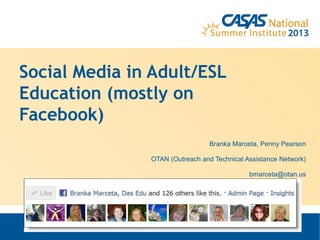Facebook.casas.si.2013.06.11
- 1. Social Media in Adult/ESL Education (mostly on Facebook) Branka Marceta, Penny Pearson OTAN (Outreach and Technical Assistance Network) bmarceta@otan.us
- 2. WHY 1 Using social networking media carries the promise of more exposure for schools to potential learners not currently being served. Also it may increase the possibilities to follow up with learners who complete the program. *
- 3. New NRS requirements • multiyear core follow-up outcome measure reporting 3
- 4. Torrance Adult School, CA *
- 5. Downey Adult School, CA *
- 6. San Diego Continuing Education *
- 7. Literacy Assistance Center, NY *
- 8. Director of a school as a public figure *
- 9. Video – promoting programs through Facebook pages *
- 10. What they do •Post on regular basis •News •About classes •Current catalog •Run contests •Ask fans/members to share/recommend to others •Ask fans/members to post about their experience in relationship to your program •Feature work by individual teachers/classes •Celebrate *
- 11. WHY 2 It also reinforces and deepens communication with the existing alumni population. *
- 12. ESL at San Diego CCD, Cont. Ed *
- 13. Sean Abajian, ESL, Los Angeles *
- 14. Video by Fluency MC *
- 15. VESL Group *
- 16. Video – FB group to support transition to work *
- 17. Video – extending learning through Facebook groups *
- 18. What they do •Provide resources •Post discussion prompts (photos, videos, questions) •Spotlight successful stories •Post photos and videos •Encourage discussion *
- 19. WHY 3 Educators use these tools to create personal professional development networks, model lifelong learning and exercise civic engagement. *
- 20. PD & PLNs on FB •CATESOL , TESOL, OTAN, NPR, TED, and Ed.gov, as well as many more organizations offering resource and information of interest to adult educators are on FB. *
- 24. Alliance for California Adult Schools *
- 25. What do they do •News updates •Videos of speeches •Discussion prompts •Sharing and learning amongst members *
- 26. HOW *
- 27. 3 types of accounts •Individual/personal profile page or timeline •Must create this to work with the other two •Fan page •Official presence by an organization or institution or celebrity. Maintained by authorized representative. •Group •Allow you to communicate directly with other people on Facebook about a specific subject. Anyone can create and admin a group. *
- 28. Creating Groups •From your news feed home page *
- 29. Building Pages •Resources by FB *
- 30. FB in Education Official Page *
- 31. Friends Lists *
- 32. BEFORE YOU START Things to consider – it will take time and resources to create online social network. And then it will take some more of the same to maintain it. *
- 33. Checklist for creating a page •Identify a person on your staff who is already familiar with the platform and allocate time •Advertise in your print catalog and on your Web site •Set a weekly reminder to provide content •Check daily to interact and oversee content •Run contests to increase membership *
- 34. Checklist for creating a group •Decide whether open or closed •Decide whether under personal account or create another (if personal organize friends in lists) •Set e-mail notifications •Invite members •Post content and media on regular basis, but not too often •Encourage discussion •Check daily to interact and oversee inappropriate content *
- 36. What’s next… Like CASAS and your school on FB *
- 37. Thank You for Attending!  We value your feedback • Please fill out the evaluation form. • Return the evaluation to your presenter.  Visit the Resource & Technology Exhibits • Golden Foyer • Tuesday & Wednesday, 8:00 am - 5:00 pm  Attend the Poster Session • Golden Ballroom • Thursday, 8:00 - 9:15 am 37CASAS National Summer Institute 2013
Editor's Notes
- #2: http://www.facebook.com/otan4us
- #3: *
- #4: http://www.nrsweb.org/foundations/NRSChanges.aspx https://casas.org/training-and-support/casas-peer-communities/california-accountability
- #5: http://www.facebook.com/#!/torranceadultschool *
- #6: http://www.facebook.com/#!/das.edu *
- #7: http://www.facebook.com/sdce.edu *
- #8: https://www.facebook.com/thelacnyc *
- #9: https://www.facebook.com/OmegaSchool *
- #10: http://www.otan.us/video/techintegration/social-media/flash/120425FacebookDT.html *
- #11: *
- #12: *
- #13: *
- #14: *
- #15: http://www.youtube.com/watch?v=3twmuq8Y14w *
- #16: *
- #17: http://www.otan.us/video/techintegration/social-media/flash/120319FacebookCTE.html *
- #18: http://www.otan.us/video/techintegration/social-media/flash/120319FacebookESL.html *
- #19: *
- #20: *
- #21: http://www.facebook.com/SecretaryArneDuncan?fref=ts *
- #22: https://www.facebook.com/CASASsystem
- #23: https://www.facebook.com/otan4us
- #24: http://www.facebook.com/CCAEStateAssociation?sk=wall *
- #25: https://www.facebook.com/AllianceForCaliforniaAdultSchools *
- #26: *
- #27: *
- #28: Official pages are maintained by authorized representatives of a business, brand, celebrity, or organization, and they can create and share content about the entities that they represent. Groups allow you to communicate directly with other people on Facebook about a specific subject. Anyone can create and admin a group. Profile page or timeline - https://www.facebook.com/help/timeline *
- #29: http://www.facebook.com/help/162866443847527/ *
- #30: http://www.facebook.com/FacebookPages?sk=app_7146470109 https://facebook-inc.box.net/shared/9e5jiyl843 *
- #31: http://www.facebook.com/education *
- #32: http://blog.facebook.com/blog.php?post=10150278932602131 http://www.youtube.com/watch?v=vpFgce6Tm0o&feature=channel_video_title *
- #33: *
- #34: http://www.facebook.com/help/pages *
- #35: http://www.facebook.com/help/groups *
- #36: *
- #37: https://www.facebook.com/CASASsystem *





































